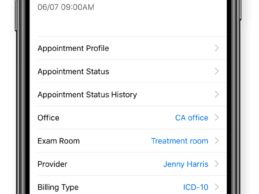What You Should Know:
- DrChrono announces today that its open FHIR API is now live enabling its patient members to securely transfer their available health records out of DrChrono into the Apple Health app on the iPhone so their medical information is consolidated and always with them.
- The Health Records feature is part of the Health app, which also shows activity, heart rate, nutrition and other health data consolidated from iPhone, Apple Watch and HealthKit-enabled third-party
Read More
Medical Records | Health Information Management | Revenue Cycle Management
Best Practices to Ensure Telehealth Security and Protect Patient Data
To support the sudden increase in test results and medical records being transmitted during the pandemic, hospitals, laboratories, and pharmacies implemented additional devices and remote connections into their networks. After the Office for Civil Rights (OCR) lifted penalties around telehealth to expand care options amid the crisis, new platforms were adopted that were not previously allowed by the Health Insurance Portability and Accountability Act (HIPAA).
This exercise of discretion
Read More
HealthTensor Secures $5M to Scale AI-Powered Medical Diagnosis Platform
What You Should Know:
- HealthTensor, an LA-based startup that uses AI to ensure no medical diagnoses are overlooked, has raised $5 million to scale operations.
- To date, HealthTensor has helped physicians write more than 2,000 notes and has identified overlooked medical conditions in 95% of cases.
HealthTensor, an LA-based artificial intelligence digital health startup that is creating software to help augment medical decision making, announced today that it has raised a $5 million
Read More
Intelligent Automation of the Revenue Cycle: How an Integrated Platform Approach Yields Financial Results
Healthcare provider networks are experiencing enormous pressure to manage financial margins and invest in contactless patient experiences. With overall financial losses projected to exceed $323 billion as a result of COVID-19, a projected $200 billion in administrative waste due to revenue cycle inefficiencies, and increasing pressure to meet digital consumerism demands, it is essential for health systems to find ways to streamline processes, maximize their revenue cycles and cut costs. These
Read More
IoMT Is Improving Patient Access: We Must Avoid Creating New Barriers
The Internet of Medical Things (IoMT) is changing the face of healthcare and has the potential to significantly improve patient access as well as system efficiencies. The adoption of telemedicine, for example, spurred on by the Covid-19 pandemic, has spread rapidly. Forrester revised its forecasts to predict that virtual care visits in the United States will soar to more than one billion this year—including 900 million visits related to Covid-19 specifically. Likewise, in the United Kingdom,
Read More
Traditional RESTful APIs Will Not Solve Healthcare’s Biggest Interoperability Problems
Interoperability is a big discussion in health care, with
new regulations requiring interoperability for patient data. Most approaches
follow the typical RESTful API approach that has become the standard method for
data exchange. Yet Health Level Seven (HL7), with its new Fast Healthcare Interoperability
Resources (FHIR) standard for the electronic transfer of health data, is
leading to a rash of implementations that, to date, are not solving core interoperability
issues.
Data is still
Read More
4 Quick Tips for Getting COVID-19 Claims Paid Promptly
As the COVID-19 pandemic has gripped the world, many providers have adopted an all-hands-on-deck approach and mentality for treating COVID-19 patients, stretching their resources to the breaking point.
We have heard about the frontline heroes who have sacrificed their own health and safety to treat patients and, in less-fortunate scenarios, comfort patients in their last moments as they were quarantined from loved ones.
What has been less recognized is the work and sacrifice
Read More
Meaningful Use of Genomics Requires Informatics Beyond EMRs
Electronic medical records (EMRs) are widely expected to serve as a cornerstone technology that drives the delivery of modern patient care.
But can the EMR alone support all the informatics capabilities required by an ever-evolving healthcare industry? The rapid growth of precision medicine, particularly the use of genetic and genomic information during clinical decision making, is a compelling example that functionality beyond the EMR is required. Not only does genomic data represent a
Read More
20 COVID-19 Predictions and Trends for 2021 – Executive Roundup
Dr. Justin Graham, Chief Medical Officer, GYANT
The rapid development of a COVID-19 vaccine is a monumental achievement, but it does nothing to address our extremely fragmented healthcare system. In 2021, policymakers must create and extend incentives to providers to work together to keep patients healthy rather than maximize profit. The pandemic has devastated the traditional fee-for-service budgets of many healthcare systems, and it isn't clear they will ever be able to catch up without
Read More
30 Executives Share Top Healthcare Predictions & Trends to Watch in 2021
As we close out the year, we asked several healthcare executives to share their predictions and trends for 2021.
Kimberly Powell, Vice President & General Manager, NVIDIA Healthcare
Federated Learning: The clinical community will increase their use of federated learning approaches to build robust AI models across various institutions, geographies, patient demographics, and medical scanners. The sensitivity and selectivity of these models are outperforming AI models
Read More










